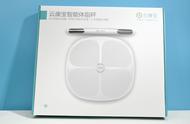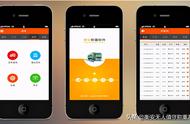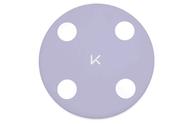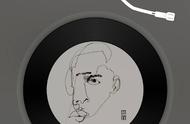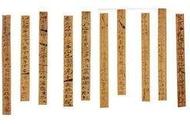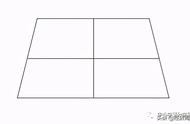The scale of the future does not have numbers or dials. It won't even tell you how much you weigh. It doesn't have a screen to display your weight because, if you ask behavioral economist at Duke University Dan Ariely, weight is a metric of the past.
未来的体重秤没有数字和表盘,不会告诉你有多重,甚至它连显示体重的屏幕都没有。如果你想知道原因的话,杜克大学的行为经济学家Dan Ariely会告诉你,体重只是一个关于过去的测量数值。

Ariely has spent his career researching the invisible machinery of human choice: why we neglect to save money for things we need we know, why we lie to our friends, and to ourselves.
Airely一直致力于探求人们决策过程的不可见机制:为什么我们会忘记为那些必需品存钱,为什么我们会欺骗朋友、欺骗自己。
Recently, he's turned his focus toward the choices we make about our health. Why, Ariely wondered, do people have such a hard time making healthy choices?
最近,他开始研究与健康相关的抉择。Ariely想知道,为什么做出健康的选择这么难呢?
Ariely imagines the common bathroom gadget as a gateway to better understanding our health, a way to subtly reshape human health behavior one pound at a time. But in order to do that, Ariely wants to rethink the scale's design.
Ariely认为,通过浴室里一个常见的小物件,可以更好地了解人们的健康状况。这是一种塑造健康行为的巧妙方法。为了达到这一需求,Ariely想要重新设计一款体重秤。

Most scales remind people of the shame, regret, and self-disgust they feel when they step onto one.
当普通体重秤上的数值又上升一格时,人们会感到羞愧、后悔和自我厌弃。
Even the simplest nugget of data can be misleading. When you see your weight go up two pounds, you assume you've done something wrong. When you see your weight go down two pounds, you assume you've done something right. Most of the time, you haven't done anything at all.
最简单的数据也可能会误导你。当你看到体重增加了两磅,你会觉得你做错了什么。当你看到体重下降两磅时,你会以为已经做了一些正确的事。其实大多数时候,你什么都没做。
"It's incredibly confusing and demotivating," says Ariely. "So we said, 'OK, let's rethink the numberless scale.'" More encouragement, less data. Ariely's dream of the unquantified self.
Ariely说:“这简直是扑朔迷离,让人失去了减肥的动力。所以我觉得,我们要再考虑一下不显示数字的体重秤。”更多的鼓励,更少的数据。Ariely想要一个不被量化的体重秤。
The smart scale designed by Ariely captures bone density and muscle mass in addition to overall weight, and it connects to your phone. You simply step on, and step off. And it never tells you how much you weigh, not even in the app.
除了测体重,Ariely设计的智能秤还可以获取骨密度和肌肉量,同时关联着你的手机。你只需要站上去,然后下来。秤上不会显示你的体重值,APP上也不会。

Instead, it analyzes all the granular information about your body and translates it into simple humanspeak: either you're doing fine, or you're not.
但是,它会综合分析身体相关的所有信息,并将其转换为最简单的人类语言:你做地很好,或者你表现不好。
Everything else happens in the scale's app, which connects to the scale via Bluetooth. The app also pulls data from the health kit on your phone — so, if you wear a smart watch, or track your workouts through a mobile app like Keep, it can synthesize that data along with your weight.
APP与体重计通过蓝牙连接。APP可以从手机上安装的健康工具中提出数据 —— 因此,如果你佩戴智能手环,或使用像Keep这样的APP跟踪记录运动,它可以将这些数据与体重数据综合起来。
Then, it then presents your health on a five-point scale: Either you're a little better, a little worse, much better, much worse, or basically the same.
然后,它会以五个等级呈现你目前的健康状况:好点了、有点不太好、好很多了、变差了很多、或没什么变化。

The five-point system takes into account the way people actually gain and lose weight. A few pounds up or down means nothing at all, especially if it's not sustained over time.
五档分类考虑到了人们实际增重和减肥的过程。体重上升或下降几磅没有任何意义,特别是如果这种变化并没有持续一段时间。
So the app creates a running average of weigh-ins over the past three weeks, and uses that to give feedback rather than your weight in a given moment. "If you're within one standard deviation," Ariely says, "then we say, 'You're just the same.'"
因此,这个APP计算的是三周内的平均重量,然后反馈信息,而不是直接显示体重值。“如果体重变化是在标准偏差范围内,APP会显示,‘没什么变化。’”Ariely说。
He thinks this approach will help people better understand how their choices are affecting their health overall, rather than what makes someone gain or lose a few fractions of a pound in a day.
他认为这种方法可以帮助人们更好地理解自己的选择如何影响健康状况,而不是让某个人在一天内增加或者减少一点点体重。

A five-month study to test the screenless scale has shown that in a control condition, people who used a regular scale gained 0.3 percent weight every month; People in the other group, using the numberless scale, lost 0.6 percent weight per month.
以测试这种不显示数字的体重计的效果为研究目的的一项研究进行了五个月。研究结果显示:使用普通体重计的对照组平均每个月增重0.3%;使用无数字体重秤的实验组,平均每个月减重0.6%。
"That means we can take an everyday object, like a scale. Look at it from perspective of social science, think about it in a different way, and design it in a way that will be more compatible with how we make decisions to get the best results. It is not just the scale," Ariely says in a speech.
Ariely在演讲中说,“这意味着我们可以将日常生活中的一个物件,比如体重计,通过社会科学的方法,从不同的方式去思考,然后将其设计得与我们的日常决策更相容,以帮助我们取得更好的结果。除了设计体重秤,这些知识还可以用在其他事情上。”
Source: wired.com, Haimianyanjiang
Editor: Zhang Xi
Intern: Zhong Wenxing
更多精彩内容请关注"CHINA DAILY"*
来源:China Daily微信公众号
